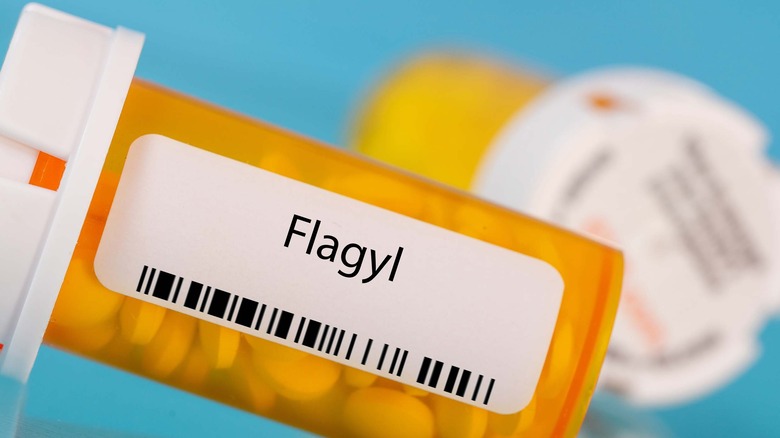Why You Should Never Drink Alcohol While Taking Metronidazole
Metronidazole, also known by the brand name, Flagyl, is commonly prescribed for many different infections (per MedlinePlus). It can treat sexually transmitted diseases, such as bacterial vaginosis, and infections of the heart, bones, and joints, among others. If you are prescribed metronidazole or Flagyl, your healthcare provider will ask if you have recently had alcohol and also advise you to avoid alcohol both throughout your treatment and for at least three days after your last dose of the medication. This is because if Flagyl is taken with alcohol or propylene glycol, it can cause several unpleasant side effects.
These side effects are due to something called a disulfiram-like reaction. A study published in The Journal of Pediatric Pharmacology and Therapeutics in 2019 explained what disulfiram-like reactions are and how certain medications containing alcohol can potentially make you ill while on Flagyl without realizing it.
The experts, for instance, explained a case study where a patient was prescribed a steroid solution containing a small amount of alcohol. The patient exhibited onset abdominal bloating and a fast heart rate. When the patient was taken off the steroid that contained alcohol, their symptoms improved. Other medications where alcohol can be found include over-the-counter products, like mouthwash.
Possible side effects of combining metronidazole with alcohol
When an individual consumes alcohol, the body metabolizes it (per the 2019 study published in The Journal of Pediatric Pharmacology and Therapeutics). When alcohol is metabolized, a byproduct called acetaldehyde is generated. Acetaldehyde is toxic to the body. However, it is usually broken down by an enzyme called acetaldehyde dehydrogenase and removed from the body.
The theory is that metronidazole may inhibit the ability of the enzyme acetaldehyde dehydrogenase to function fully, if at all. This leads to a buildup of acetaldehyde in the body. Since acetaldehyde is toxic, it can lead to several unpleasant symptoms. These side effects range from milder side effects, such as nausea and vomiting, abdominal pain, flushing, fast heart rate, bad headaches, and fainting, to more severe side effects, like decreased breathing ability, heart dysfunctions, irregular heartbeats, convulsions, and even death.
However, Medscape explains that controversy exists around whether or not metronidazole actually does cause such unpleasant side effects when consumed with alcohol.
Conflicting data over reactions between metronidazole and alcohol
Turns out, alcohol does not need to be avoided while taking metronidazole, according to the Centers for Disease Control and Prevention (CDC). The experts at CDC explain that the previous research used to develop this warning was taken from laboratory studies and individual case studies. In contrast, the package insert for Flagyl from the Food and Drug Administration (FDA) lists the interaction of Flagyl with alcohol. It states to avoid alcohol or other products containing propylene glycol (a type of alcohol) while taking Flagyl and for three days post-treatment with Flagyl.
In fact, a 2020 study published in the journal Antimicrobial Agents and Chemotherapy explored what is known about various antibiotics, such as Flagyl, and their interactions with alcohol.The study determined there are a lot of knowledge gaps and that the available data raises doubts about the reaction between Flagyl and alcohol. Therefore, reactions do not happen consistently, and when they do appear to occur, the severity of reactions varies widely.
So, if you are prescribed metronidazole or Flagyl for an infection, it is important to go with the advice of your healthcare provider and pharmacist regarding medication use and alcohol. They can provide you with the most up-to-date information and help ensure safe treatment based on your health needs.



